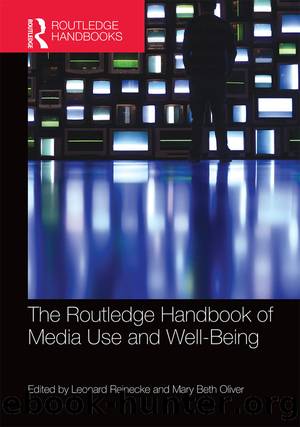The Routledge Handbook of Media Use and Well-Being by Reinecke Leonard; Oliver Mary Beth; & Mary Beth Oliver

Author:Reinecke, Leonard; Oliver, Mary Beth; & Mary Beth Oliver
Language: eng
Format: epub
ISBN: 4568562
Publisher: Taylor & Francis Group
Published: 2017-06-14T16:00:00+00:00
Aspects of Well-Being in Internet Addiction
As has already been discussed in the introduction, research on Internet Addiction is a young scientific endeavor. Therefore, it is not surprising that investigations into the relationship between excessive and addictive Internet use and specific outcome variables, such as psychological well-being, are also scarce. Given the definition of psychological well-being as a dynamic concept generally related to the subjective evaluation of the quality of intrapersonal and interpersonal functioning (Lent, 2004; see also the chapter by Huta in this volume), it becomes evident that Internet Addiction is probably related to low well-being. This hypothesis can be derived from findings on high psychopathological symptoms and comorbid disorders (e.g., affective and anxiety disorders) associated with Internet Addiction in both adolescents and adults (Carli et al., 2012; Jang, Hwang, & Choi, 2008; Müller, Beutel, & Wölfling, 2014). Furthermore, clinical research has demonstrated that patients suffering from Internet Addiction display higher levels of psychosocial impairment and lower levels of intrapersonal functioning compared to subjects spending an inordinate amount of time online or showing excessive but not addictive use (Müller, Beutel, & Wölfling, 2014). Impaired functioning is often negatively related to academic and job-related achievement, the quality of social interactions, and indicators of cognitive performance such as attention and memory. These associations were also demonstrated in large-scale epidemiological surveys on adolescents in Europe (Tsitsika et al., 2014; Müller et al., 2015) and support the conclusion that Internet Addiction is associated with decreased well-being.
In addition, there are first studies directly addressing well-being as a correlate of Internet Addiction and Internet Gaming Disorder. Applying cross-sectional designs, these studies confirm the notion that low well-being indeed correlates with excessive and addictive Internet use (e.g. Wang et al., 2008). However, the direction of effects remains an unresolved issue. Is low well-being a predisposition for Internet Addiction or rather its consequence? One of the few studies using a six-month longitudinal design to explore this question was conducted in the Netherlands (Lemmens et al., 2011). The authors identified decreased well-being and low life satisfaction as predictors of Internet Addiction irrespective of gender or other demographic variables. They also demonstrated that deficient social skills, loneliness, and low self-esteem were the most potent predictors of addictive Internet behavior. These findings stress the need for clinical interventions that enhance well-being at an early stage to reduce the risk of Internet Addiction and a number of additional adverse long-term outcomes of impaired psychological well-being (e.g., interpersonal conflicts, enhanced risk of depressive disorders, and suicidality; Paradis, Reinherz, Giaconia, & Fitzmaurice, 2006).
Download
This site does not store any files on its server. We only index and link to content provided by other sites. Please contact the content providers to delete copyright contents if any and email us, we'll remove relevant links or contents immediately.
Cecilia; Or, Memoirs of an Heiress — Volume 1 by Fanny Burney(31332)
Cecilia; Or, Memoirs of an Heiress — Volume 3 by Fanny Burney(30934)
Cecilia; Or, Memoirs of an Heiress — Volume 2 by Fanny Burney(30889)
The Great Music City by Andrea Baker(21264)
We're Going to Need More Wine by Gabrielle Union(18072)
Bombshells: Glamour Girls of a Lifetime by Sullivan Steve(13107)
Pimp by Iceberg Slim(12929)
All the Missing Girls by Megan Miranda(12746)
Fifty Shades Freed by E L James(12449)
Norse Mythology by Gaiman Neil(11882)
Talking to Strangers by Malcolm Gladwell(11875)
Crazy Rich Asians by Kevin Kwan(8348)
Mindhunter: Inside the FBI's Elite Serial Crime Unit by John E. Douglas & Mark Olshaker(7833)
The Lost Art of Listening by Michael P. Nichols(6469)
Enlightenment Now: The Case for Reason, Science, Humanism, and Progress by Steven Pinker(6405)
Bad Blood by John Carreyrou(5767)
The Four Agreements by Don Miguel Ruiz(5510)
Weapons of Math Destruction by Cathy O'Neil(5034)
We Need to Talk by Celeste Headlee(4868)
